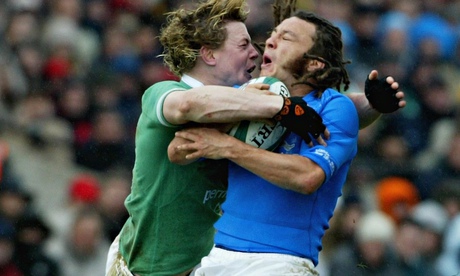Documentary examines rise in injuries in rugby union and other sports that can cause brain damage in later life

Head Games: The Global Concussion Crisis focuses on what it calls a 'silent, global' epidemic of head injuries triggered by contact sports. Photograph: Jamie Mcdonald/Getty Images Sport
Barry O'Driscoll, the former medical adviser to the International Rugby Board, is under no illusion about the defining moment of Ireland's 13-13 draw with France in March last year. The decision to allow his nephew, the multi-capped centre Brian O'Driscoll, to return to the pitch after suffering concussion was an outrage, he said.
"If that had been allowed in the United States, during an American football match, then the officials involved would have been sacked," he said.
O'Driscoll – who resigned from the IRB's medical advisory board in 2012 in protest at its handling of the issues of concussion and brain injury – was speaking in the documentary, Head Games: The Global Concussion Crisis, which premiered in London last week. The American-made film focuses on what it describes as "a silent, global epidemic" of head injuries and traumas triggered by sports that are becoming increasingly robust and are leaving more and more former players suffering fromdementia and the effects of brain damage in their middle years. These sports include American football, ice hockey – and rugby.
In the case of rugby union, the sport has become hardened and sharpened in the wake of it turning professional in the 1990s. Players today are bigger, stronger, faster and more able to hurt each other than in the past. Concussion was once treated as a joke – as is revealed by amateur video included in Head Games – but today has become an extremely worrying problem. Too many injuries to the head and a player is put at risk of succumbing to chronic traumatic encephalopathy (CTE) in later life.
CTE was once known as dementia pugilistica or being punch drunk, a condition that affected boxers in their later years. But now doctors and neurologists are finding that it affects former players of many other sports where there are intense levels of contact and head injury. Five years ago the wider dangers of CTE were first revealed in the US where it was discovered that it was affecting former top-level American football players. At first the National Football League (NFL) rejected a link between head injuries suffered during games and the later onset of depression, dizzy spells and suicide attempts among former players. "It was a bit like the tobacco industry attempting to deny the link between smoking and cancer," says Christopher Newinski, a former NFL player who is the author of the book Head Games on which the film is based.
However, a scientific paper published in 2009 revealed that former NFL players were 19 times more likely to suffer from early onset Alzheimer's disease than the general public. Further studies have backed these conclusions and since then there has been far greater care taken about players who suffer head injuries during matches. In particular, they are not allowed back on pitch and are prevented from playing again for periods of up to several weeks.
But other sports – on both sides of the Atlantic – have been slower to catch up on the newly revealed dangers posed by head traumas, as the producers of Head Games reveal by focusing on ice hockey, Australian rules football, and rugby union. Former players describe bouts of concussion, disrupted sleep, changes in personality and loss of memory since ending their days as professional players. These stories are interspersed with clips of incidents of eye-watering violence as players are battered and pounded on the head – but then expected to continue playing after treatment.
As neurologist Professor Laura Balcer, of New York University, states on the film, it is clear from evidence that a person should not be allowed to suffer continued injuries to the head. "If you suffer concussion on three occasions, you should think of retiring," she says.
The problem, which the film acknowledges, is that these sports all provide amateur players with a great deal of pleasure. The trick is to find a way of allowing people to continue enjoying a sport without risk of succumbing to dementia in later years. As former Canadian ice hockey star Keith Primeau admits: "It is a problem that young players simply do not want to know about."
http://www.theguardian.com/sport/2014/mar/08/rugby-sport-head-games-film-brain-damage-dementia
0 comments:
Post a Comment